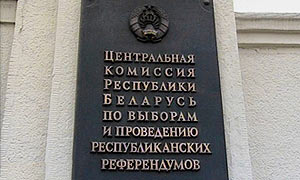CEC rejects procedure of transparent vote count
The Belarusian Helsinki Committee has received a response to its appeal to the Central Election Commission. In its address, the BHC asked to implement three simple solutions, which could considerably improve the transparency of the electoral process:
- Publish separate results of voting for each polling station;
- Provide observers working at the polling stations with certified copies of the protocols about the results of voting;
- Establish the exact procedure of vote count, with the mark on each ballot announced and demonstrated to the election commission members and observers.
The Central Election Commission says precise counting procedures are "the establishment of new rights and obligations for members of election commissions, additions to the procedure of counting of votes," which the CEC is not empowered to do. Meanwhile, the CEC further writes that the guidelines for members of election commissions clarify the provisions of Article 55 of the Electoral Code regulating the procedure of counting of votes. "They are not only explained, but also detailed, which secures their implementation by the precinct commissions in the sequence and under the procedure established by law. The division of responsibilities among the members of the commission is the function of its chairman,” says the CEC. That is, the CEC detailed the procedure of vote count and described the responsibilities of the members of election commissions, despite claims of lack of jurisdiction.
With regard to receiving a certified copy of the final protocol, the Central Election Commission once again refers to lack of jurisdiction, saying that it requires regulation by the Electoral Code. The EC now indicates that "the observer has the right to make a copy of the protocol with his own means. Otherwise, legislators would have indicated the observer’s right to receive a certified copy of the document and therefore the obligation of the commission chairperson to issue a certified copy,” according to the CEC.
A similar reason is cited by the CEC when answering the proposition to publish separate voting results – “it is not provided by law.” “The proposals for the Central Election Commission on three items contained in the appeal cannot be executed because they are essentially separate legal provisions that provide for changes in legislation,” says the CEC.
The answer is commented upon by Chairman of the Belarusian Helsinki Committee Aleh Hulak:
“It is surprising how flexible the Central Election Commission is when understanding and applying the Electoral Code.
First, the Central Election Commission introduces a rule, which is not provided by the EC, for example, that observers who have been deprived of their accreditation have no right to re-accreditation, then it so narrowly interprets its powers that it cannot increase the transparency of the electoral process.
According to Article 33 of the Electoral Code, the Central Commission, among other things:
3) provides clarifications regarding the legislation of the Republic of Belarus on elections, referendums, recall of deputies and members of the Council of the Republic for the purpose of its uniform implementation;
5) directs activities of electoral commissions, commissions on the referendum, commissions on the holding of voting for recall of deputies, hear their information, provide to these commissions methodological, organizational and technical support;
6) when required, decides in essence issues pertaining to the competence of a lower commission;
The EC regulates the procedure of counting of votes, but there is no clear description of the way in which members of the commission must determine the number of ballots for a particular candidate. The usual practice is when each member of the precinct commission simultaneously counts only a pack of ballots and the result are transferred to the chairman on a sheet of paper. And none of the commission members, and the observers can be sure that the result is in fact true. In its guidelines, the Central Election Commission provides guidance to the precinct commissions that this procedure is determined by the chairman. In this situation, it seems, to put it mildly, a trick to refuse to give guidance in the framework of the existing guidelines that is important to use the method of counting of ballots, which gives credence to this calculation.
But, of course, the height of the CEC’s liberalism and modesty is being unable to demand that the subordinate territorial commissions provided data on the voting results from all polling station commissions in the electronic form (or on paper). If only these valuable qualities could be applied in accordance with Article 59 of the Constitution to ensure the conduct of genuinely transparent elections, and not vice versa.”


















